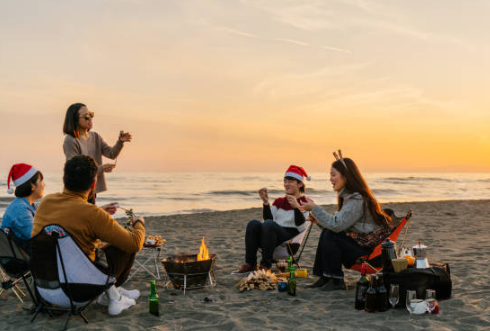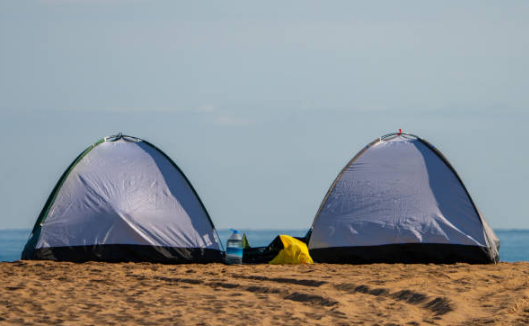Beach camping is a totally different experience from camping in the woods or mountains. There’s something about being by the ocean that awakens a wild, energetic part of me. Maybe it’s because I grew up on a small island where untouched, wild landscapes were rare, so the beach always felt like the ultimate escape. The coastline offers wide open spaces, endless horizons, and a sense of absolute freedom. The ever-changing tides, waves, sand patterns, beach streams, and shifting weather fronts fuel my deep love for coastal living. It’s no wonder beach camping is so incredibly appealing and refreshing.
For families, nature lovers, or anyone drawn to a simpler, more free-spirited way of life, beach camping can be the ultimate summer getaway. While there are plenty of official campgrounds with ocean views and beach access, nothing beats waking up with nothing but sand and sea in front of you, stretching all the way to the horizon. Unfortunately, in most places, camping outside of designated areas is illegal, making your dream beach escape a little tricky to pull off.
Wild Beach Camping
That said, wild beach camping isn’t totally out of reach. With a bit of planning, research, and a respectful attitude, you can still find off-the-beaten-path spots that feel like your own private island—worthy of a modern-day Robinson Crusoe. I once spent a week sleeping on a remote beach in Greece with no issues at all. So if you’re craving that raw, back-to-nature beach experience, here are some things to keep in mind:
1) Access and Permissions
One of the biggest challenges with wild camping is land ownership. Most land is privately owned, and camping without permission may be illegal. If you’ve got your eye on a perfect spot, check in with local authorities or state parks to find out what’s allowed. They may say it’s okay—or point you to a better (legal) alternative.
2) Beach Camping Tips
If you decide not to go the official route, aim to stay out of sight and away from busy areas. The more remote and discreet your spot is, the less likely you are to be asked to move. Plus, you’ll enjoy a much more peaceful experience. For the more adventurous campers, here are some smart tips:
Do:
-
Consider sleeping under the stars instead of setting up a tent.
-
If you use a tent, choose muted colors like dark green or brown, and avoid bright or reflective materials.
-
Pack light—ideally everything should fit in one backpack.
-
Make sure your site is not visible from houses, roads, or other campsites.
-
Scout the area during the day; if you’re unsure about being seen, return after dark.
Don’t:
-
Don’t camp in the middle of the beach—stick to areas near rocks or dunes.
-
Don’t start a fire unless you’re sure no one will see the flames or smoke.
-
Don’t overstay—pack up early in the morning to make it look like you were just there to catch the sunrise.
-
Don’t bring a big group—smaller parties make less noise and leave less impact.
3) Leave No Trace
Like any outdoor adventure, leaving no trace is absolutely crucial. It’s not just about being eco-friendly—it’s about preserving these beautiful places for future campers. To minimize your footprint:
-
Dig a small hole for waste and make sure it’s at least 100 feet from any water source.
-
Pack out all your trash—don’t leave anything behind.
-
Avoid camping on delicate dune ecosystems; they may seem like great shelter, but they’re home to important wildlife.
-
Use biodegradable soap and cleaning products.
-
If you make a fire, bury the ashes and avoid scorching rocks with smoke and flames.
4) Setting Up Camp
To make your beach stay as comfortable (and safe) as possible, keep these extra details in mind:
-
Set up camp well above the high tide line. If you’re unsure, check local tide charts or look for debris lines from the last storm.
-
Find a wind-sheltered spot—wind direction can make a big difference in comfort.
-
Use sand stakes or anchor your tent with rocks or trees to keep it secure in the sand.
-
If you’re not using a tent, bring a tarp for quick shelter if the weather turns. In hot areas, it doubles as sun protection.
-
For bugs, hang a mosquito net using sticks or secure it under your tarp.
-
Always use a sleeping pad—a good one keeps you insulated and prevents crab encounters (yes, it happens!).
-
Bring a way to purify water, and try to camp near a freshwater source if possible.
5) Campfire Cooking
One of the best parts of beach camping? Kicking back around a crackling campfire, listening to the waves and maybe a distant seagull or two. It’s pure magic—so don’t let bad food or a weak fire ruin the vibe. You’ll need a solid bed of coals to cook on, so plan accordingly:
-
Dig a shallow fire pit in the sand to shield your flames from the wind. This also makes it easy to smother the fire with sand (and pour seawater on top to make sure it’s out).
-
Bring plenty of firewood—some for starting the fire and bigger logs to keep it going through the night.
-
Once your fire burns down to glowing embers, you’re ready to cook.
-
Whatever you’re grilling or watching on the beach, be mindful of the wildlife and the land—leave no trace and stay respectful of the natural beauty around you.
Most of all—enjoy. Let the waves soothe you, let the stars light your night, and take in every peaceful moment on the sand. Beach camping really is the closest thing to paradise.


